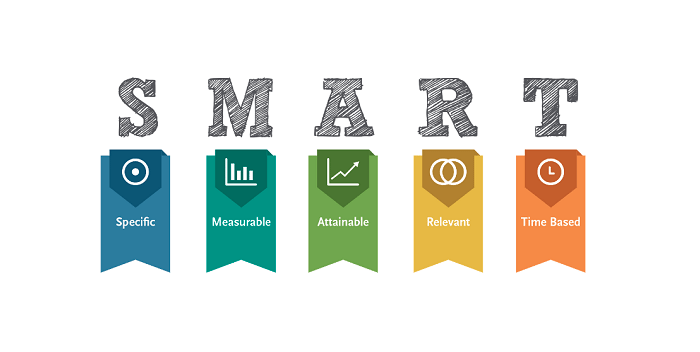Happy New Year

I hope everyone has had a safe and healthy holiday season. Now that 2025 is upon us, we’re often bombarded with tips and information on goal setting and New Year’s resolutions. For many of you, the topic of resolutions triggers an eye roll, as we know most people give up on their resolutions within a few weeks. But we know that setting goals and making an action plan to reach them is one of the first steps toward creating a lasting change.
The most common goal-setting framework is to make SMART goals. SMART goals are a framework for setting objectives to enhance clarity and focus. The acronym stands for Specific, Measurable, Achievable, Relevant, and Time-bound. Here’s a breakdown of each component with examples related to nutrition and fitness:
1. **Specific**: Your goal cannot be too vague.
For example, Instead of saying, “I want to eat healthier,” a specific goal would be, “I want to eat five servings of fruits and vegetables daily.”
2. **Measurable**: You should be able to track your progress.
– Example: “I will track my daily fruit and vegetable intake using an app to ensure I reach my five servings daily.”
3. **Achievable**: The goal should be realistic and attainable based on your current resources and constraints.
– Example: If you currently average two servings of fruits and vegetables a day, a goal of reaching five servings in a month may be realistic by gradually increasing your intake.
4. **Relevant**: The goal should matter to you and align with your objectives.
– Example: “Eating more fruits and vegetables is relevant because I want to improve my energy levels and overall health.”
5. **Time-bound**: There should be a deadline for when you want to achieve your goal.
– Example: “I will achieve my goal of eating five servings of fruits and vegetables daily within the next 4 weeks.”
Putting it all together, a SMART goal in nutrition could be: “In the next 4 weeks, I will increase my fruit and vegetable intake to 5 servings a day, tracking my progress using an app.”
For a fitness example:
1. **Specific**: “I want to run a 5K.”
2. **Measurable**: “I will measure my running distance and time using a fitness tracker.”
3. **Achievable**: “I have been running twice weekly, so I can realistically increase my distance each week.”
4. **Relevant**: “Running a 5K is important to me because I want to improve my cardiovascular health.”
5. **Time-bound**: “I will train to run the 5K in 3 months.”
A complete SMART goal for fitness would be: “I will train to run a 5K in 3 months, increasing my running distance by 0.5 miles each week, and track my progress with a fitness app.”
The SMART framework can help ensure your goals are clear and attainable, increasing the likelihood of success.
However, there are many pitfalls to making SMART goals. A common error is to confuse an outcome goal with a behavioural goal. In the examples above, the specific goal is a behaviour (eating fruit and vegetables, running a 5k). Unfortunately, it is easy to focus on an outcome instead, such as “I want to weigh X” or “I want to qualify for the national championship.” There’s nothing wrong with including outcomes in your goal setting. Still, some of these things are out of one’s control (dependent on external factors) or do not involve a behaviour you can perform regularly. The best goals are those requiring engagement daily or weekly.
Secondly, it’s good to consider that life happens, and there will be many roadblocks along the way. We commonly write goals when we have less stress and free time but do not consider what happens when we are ill, busy, stressed or away from home. Add a list of foreseeable barriers to reaching your goals and possible solutions to overcome those barriers. Travelling may make eating your fruits and vegetables more complex, so think of ways to overcome this, such as packing fruits and vegetables or searching for healthy lunch places and juice bars.
Lastly, we may have great goals but cannot decide what is achievable and relevant. Unfortunately, plenty of misinformation out there skews what is feasible or can cause us to focus on behaviours that are not unsustainable. Too often, we cut down our daily food intake too much or push our bodies too hard too soon in the gym, causing burnout and a drop in motivation. Running a 5k is doable for many runners, but increasing your running distance too quickly or not implementing proper recovery can lead to disaster. The best way to avoid this is by talking with an expert. Having a coach to help you set realistic and sustainable goals and a plan that takes you there in the least time is an invaluable resource. Every person is different; one goal can be easily achievable by one person but nearly impossible for another. Having a personalized plan can have a dramatic impact.
Do you have some goals you want to achieve this year? Do you struggle with implementing realistic and achievable steps to get you closer to your goals? Send a message by going to www.superwomentraining.com or email contact@superwomentraining.com
Take care,
Coach Flo